Discovering mice in your home can be alarming, especially when you wonder if these tiny intruders might bite while you sleep. This comprehensive guide explains the truth about mouse bites, identifies the risks they pose, and provides clear steps for treatment if you ever experience a bite from these common household pests.
Do Mice Bite Humans?
Many homeowners worry about mice taking a bite out of them while they sleep, but the reality is that mouse bites are quite rare. Before diving deeper into whether mice pose a biting risk, it’s important to understand the difference between field mice and house mice.
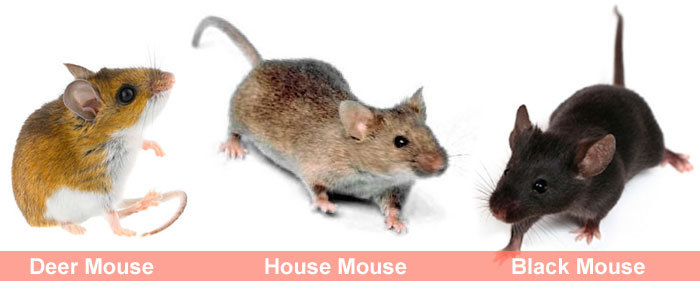
Types of Mice: Know Your Intruder
Field Mice (Deer Mice)
- Brown bodies with white feet
- Shorter tails with tiny hairs
- Average length: 7 inches
- Carriers of hantavirus
- Climbers that store food for later
House Mice
- Various colors (gray, black, brown)
- Long hairless tails
- Average length: 5 inches
- Carriers of leptospirosis
- Good jumpers that eat while foraging
Field Mice: Are You In Danger?
Field mice rarely bite humans – they’re generally more afraid of you than you are of them. However, bites can occur under specific circumstances:
Never handle mice with bare hands. Diseases can be transmitted through contact with their fur, urine, or droppings – not just through bites.
House Mice Biting Behavior
Similar to field mice, house mice typically avoid human confrontation and rarely bite unprovoked. A house mouse will generally only bite a human when it feels threatened or trapped.
Does the mouse feel trapped? Did you startle it? Is it defending a nest? If yes to any of these questions, keep your distance to avoid a potential bite.
Can Mice Bite You In Your Sleep?
Many people worry about mice biting them while they sleep, but this is extremely rare. Unlike some rat species that occasionally bite sleeping humans, mice are naturally timid and prefer to avoid contact with people whenever possible.
Food crumbs in your bedding can attract mice to your sleeping area, increasing the minimal chance of nighttime encounters.
Remember these facts about mice and sleeping:
- Mice are naturally scared of humans and avoid close contact
- They may run across you as a shortcut but rarely stop to bite
- Serious bites during sleep are more commonly associated with rats, not mice
Mouse Bite Symptoms
Mouse bites can be subtle and may be difficult to identify initially. Here are the key symptoms to look for:
| Symptom | Description |
|---|---|
| Puncture Wound | Small hole or mark where teeth penetrated skin |
| Pain | Localized discomfort at bite site |
| Redness | Inflammation around the wound |
| Swelling | Raised or puffy skin around bite area |
| Bleeding | Minor bleeding that typically stops quickly |
| Numbness | Reduced sensation around the bite area |
What Does a Mouse Bite Look Like?
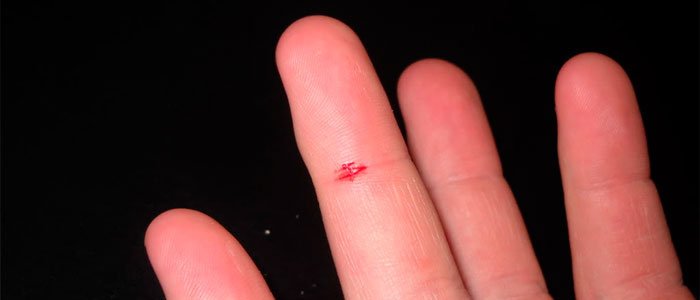
Unlike what many fear, mouse bites don’t result in large chunks of missing flesh. A typical mouse bite appears as a small puncture wound, usually on the hands or fingers of someone who accidentally encountered a mouse.
What Happens If A Mouse Bites You?
If you experience a mouse bite, there’s usually no need to panic. Most bites don’t lead to serious infections, though the wound site should be monitored closely, especially in vulnerable individuals.
The Dangers of Mouse Bites
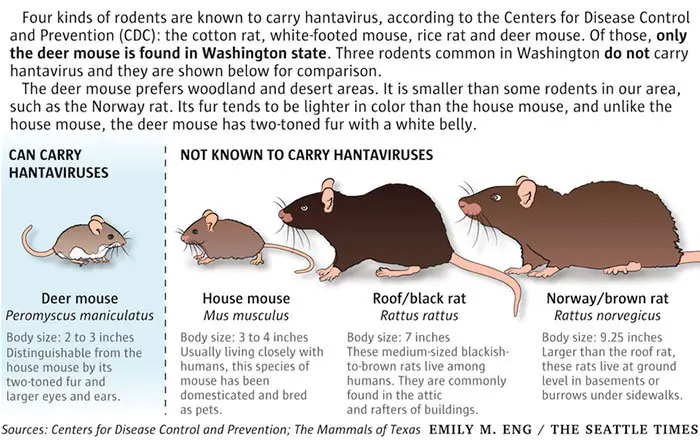
Mice can carry over 30 different diseases transmissible to humans, including:
Potential Mouse-Transmitted Diseases
- Hantavirus
- Rat-bite fever (RBF)
- Lyme disease
- Typhus
- Various pox infections
- Salmonellosis
Rat-Bite Fever Symptoms
Although called “rat-bite fever,” this disease can also be transmitted by mice. There are two main types to be aware of:
| Type | Onset Period | Symptoms |
|---|---|---|
| Streptobacillary RBF | 3-10 days after exposure | Fever, vomiting, headache, muscle pain, joint pain, rash |
| Spirillary RBF (Sodoku) | 7-21 days after exposure | Recurring fever, ulcer at bite site, swelling, swollen lymph nodes, rash (appears after wound begins healing) |
During the Middle Ages, rodents (including mice) transmitted bubonic plague or “Black Death.” While extremely rare today, this illustrates the historical significance of proper rodent control.
Watch for These Infection Warning Signs
After a mouse bite, monitor for these symptoms that may indicate a developing infection:
- Worsening pain at the bite site
- Fever development
- Increasing redness or inflammation
- Red streaks radiating from the wound
- Swollen lymph nodes (neck, groin, armpit, or near wound)
- Signs of cellulitis (heat, tenderness, and swelling)
Elderly individuals, infants, and those with compromised immune systems should be especially vigilant about monitoring potential infections from mouse bites.
What Treatment Should You Seek for a Mouse Bite?
While anxiety following a mouse bite is normal, following proper first aid procedures can significantly reduce infection risks.
- Wash the wound thoroughly with soap and warm water for at least 5 minutes
- Inspect for and carefully remove any debris from the wound
- Apply hydrogen peroxide to disinfect the wound
- Apply an antibacterial cream or ointment
- Cover with a clean bandage, changing daily or when soiled
- Consider a tetanus booster vaccination if yours isn’t current
Contact a healthcare professional if you develop fever, increasing pain, spreading redness, or other signs of infection following a mouse bite.
Prevention: Avoiding Mouse Bites
The best way to prevent mouse bites is to maintain a mouse-free home through proper prevention and control measures:
Mouse-Proofing Tips
- Store pet food in sealed containers
- Take out trash regularly
- Fix leaky pipes that provide water sources
- Trim vegetation near your home’s exterior
- Use steel wool to fill small gaps around pipes
Frequently Asked Questions
Do mice bite humans unprovoked?
Mice rarely bite humans unprovoked. They typically only bite when they feel cornered, threatened, or are handling their young. Mice are naturally timid creatures that prefer to avoid human contact whenever possible.
Are mouse bites dangerous?
While most mouse bites aren’t immediately dangerous, they can potentially transmit diseases like rat-bite fever, hantavirus, or cause secondary infections. Always clean a bite thoroughly and monitor for signs of infection.
What does a mouse bite look like?
A mouse bite typically appears as a small puncture wound about 1-2mm in size. The area may show minor redness, swelling, and tenderness. Unlike larger rodents, mice rarely remove tissue when they bite.
Should I go to the doctor if a mouse bites me?
While not all mouse bites require immediate medical attention, it’s advisable to consult a healthcare professional, especially if you have a compromised immune system or develop signs of infection like increasing pain, spreading redness, or fever.
Will mice bite me in my sleep?
It’s extremely rare for mice to bite humans during sleep. Mice are naturally fearful of humans and will typically avoid close contact. To further reduce this minimal risk, avoid eating in bed and keep your sleeping area free of food crumbs.
What’s the difference between a rat bite and a mouse bite?
Rat bites are typically larger and deeper than mouse bites, often causing more tissue damage and bleeding. Rats are also more likely to bite humans in certain circumstances than mice, which generally prefer to flee rather than confront humans.
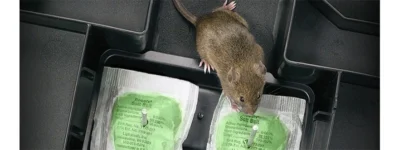

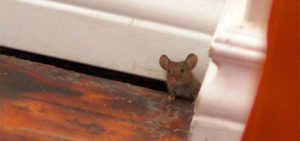

I can attest firsthand that a small mouse will bite a sleeping person. We had a very tenacious gray mouse get into our home and one of the first signs it was in the house was one night around 3am, I was startled awake by what felt like tiny nail clippers nipping the tip of a finger. It was a very small nip but it drew blood. The next morning I found tell-tale mice droppings against the wall behind the bed. I should add, I have a large Labrador who sleeps at the foot of the bed and barely even stirred when this happened.
Over the next couple weeks, we’d usually find it scurrying in the early morning and sometimes would hear it behind cabinets, furniture or appliances. Oddly, it seemed to find and really like cough drops and bubble gum. One time, I discovered it eating gum in a drawer and it jumped out of the drawer upon discovery and literally disappeared. I eventually found it’s hideaway behind the dishwasher where there was a stash of gum wrappers and shredded tissue paper. Various sprays, bleach, snap traps, toxic bait traps and even sticky paper never caught it. I guess it got bored and moved on.
What about when ur dog catches mice or rat does it harm them. I have two dogs that hunt them all day an when they catch one it looks like one bite an it’s done but I worry it’s poisoning them also.
I bite a rat while im sleeping,i have wounds,in my fingers a little,it is a dangerous?
Tetanus? Really? Tetanus only happens in puncture wounds that don’t have access to air, usually from a barnyard issue. Tetanus is anaerobic.
What about little tiny puncture wounds? The blood that comes out is very sticky. I have bandages all over my arms and legs. I put diatenaesous earth all around the bed. I’m going to get a tetanus shotnext week. I thought I heard scratching around my garbage can. It’s scary. I have a heart-ache on one side and my heart beats really hard. The skin doctor took byopseyies for bug bites and the found nothing. This has been going on over a year. I’ve always had a cat. They DON’T help.
Spider bites. There are usually 2 puncture holes but not always. I’ve had spider bites take months to go away
mouse bite or abcess like hardened area around it.Is this something like cellulitis?